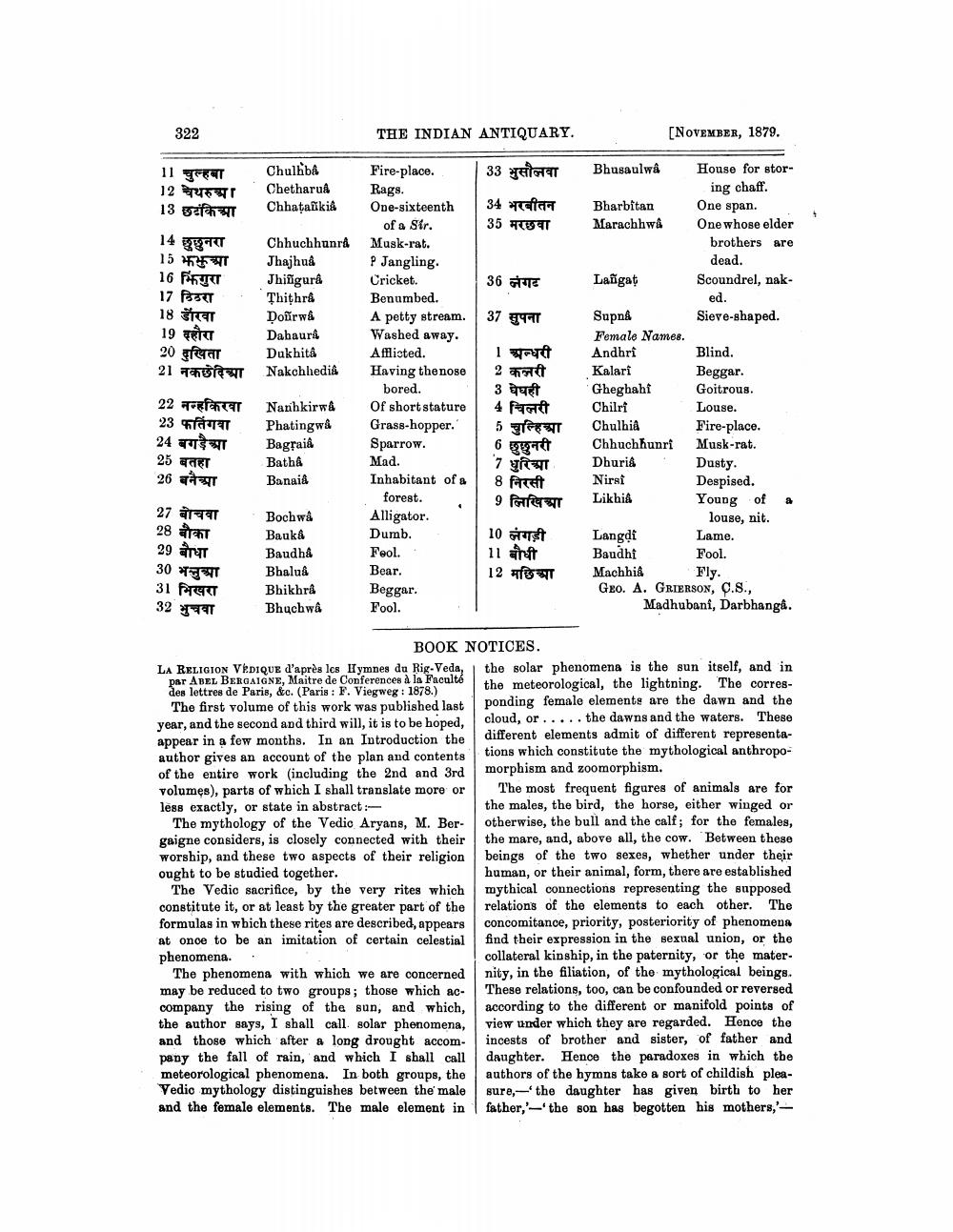________________
322
THE INDIAN ANTIQUARY.
[NOVEMBER, 1879.
Fire-place.
33
GET
Chulka Chetharu Chhatafikis
12 per 13 gaf
Rags.
34 patata 35 HOT
36 am
14 BERT 15 FT 16 ffy 17 FEET 18 ŠTET 19 TERT 20 great 21 नकछदिया
Chhuchhunrå Jhajhua Jhingura Thithra Doñrwa Dahaura Dukhita Nakchhedia
37
9 FT
Nanhkirwa Phatingwa Bagraiâ Bath& Banais
Bhusaulwa House for stor
ing chaff. Bharbitan One span. Marachhwa One whose elder
brothers are
dead. Langat Scoundrel, nak.
ed. Supna Sieve-shaped. Female Names. Andhri
Blind. Kalari
Beggar. Gheghahi
Goitrous. Chilri
Louse. Chulhill
Fire-place. Chhuchhunri Musk-rat. Dhuria Dusty Nirsi
Despised. Likhia
Young of a
louse, nit. Langdi Lame. Baudhi Fool. Machhi Geo. A. GRIERSON, Ç.s.,
Madhubani, Darbhanga.
One-sixteenth
of a Sír. Musk-rat. P Jangling Cricket. Benumbed. A petty stream. Washed away. Afflicted. Having the nose
bored. Of short stature Grass-hopper. Sparrow. Mad. Inhabitant of a
forest. Alligator. Dumb. Feol. Bear. Beggar. Fool.
22 नन्हकिरवा 23 TT 24 YT 25 CET 26 27 27 ártal 28 år 29 ATT 30 TEST 31 PART 32 TTT
It 2 3 t 4 Part 5 6 gadt 7 yita 8 facet 9 Para
Bochwa Bauka Baudha Bhalus Bhikhra Bhychwa
10 at 11 arft 12 AT
BOOK NOTICES. LA RELIGION VEDIQUE d'après les lymnes du Rig Veda, the solar phenomena is the sun itself, and in
par ABEL BERGAIGNE, Maitre de Conferences à la Faculté des lettres de Paris, &c. (Paris: F. Viegweg : 1878.)
the meteorological, the lightning. The corresThe first volume of this work was published last
ponding female elements are the dawn and the year, and the second and third will, it is to be hoped,
cloud, or ..... the dawns and the waters. These appear in a few months. In an Introduction the
different elements admit of different representaauthor gives an account of the plan and contents
tions which constitute the mythological anthropoof the entire work (including the 2nd and 3rd
morphism and zoomorphism. volumes), parts of which I shall translate more or The most frequent figures of animals are for less exactly, or state in abstract:
the males, the bird, the horse, either winged or The mythology of the Vedic Aryans, M. Ber- otherwise, the bull and the calf; for the females, gaigne considers, is closely connected with their the mare, and, above all, the cow. Between these worship, and these two aspects of their religion beings of the two sexes, whether under their ought to be studied together.
human, or their animal, form, there are established The Vedic sacrifice, by the very rites which mythical connections representing the supposed constitute it, or at least by the greater part of the relations of the elements to each other. The formulas in which these rites are described, appears concomitance, priority, posteriority of phenomena at onoe to be an imitation of certain celestial find their expression in the sexual union, or the phenomena. .
collateral kinship, in the paternity, or the mater. The phenomena with which we are concerned nity, in the filiation, of the mythological beings. may be reduced to two groups; those which ac- These relations, too, can be confounded or reversed company the rising of the sun, and which, according to the different or manifold points of the author says, I shall callsolar phenomena, view under which they are regarded. Hence the and those which after a long drought accom- incests of brother and sister, of father and pany the fall of rain, and which I shall call daughter. Hence the paradoxes in which the meteorological phenomena. In both groups, the authors of the hymns take a sort of childish pleaVedic mythology distinguishes between the male sure, the daughter has given birth to her and the female elements. The male element in father, the son has begotten his mothers,




